Bernese Mountain Dogs, also affectionately known as Berners, are giant, fluffy dogs that can weigh anywhere from 70-130 pounds when fully grown. They grow differently than smaller dog breeds and tend to hit developmental milestones later in life than you might expect.
In this full guide to Bernese Mountain Dog growth, we’ll discuss training tips and when to expect your Bernese Mountain Dog to start teething, pottying outside, and more!
Breed Summary
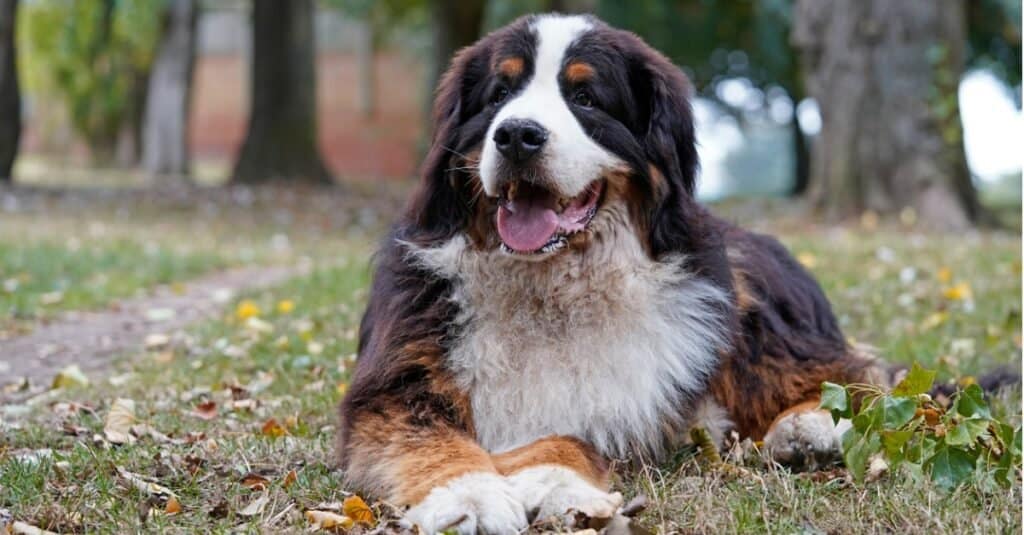
When it comes to Bernese Mountain Dog growth, the breed takes longer to fully develop compared to smaller dog breeds.
©iStock.com/Kriste Sorokaite
The Bernese Mountain Dog is a giant dog breed that can grow up to 115 pounds! These dogs are strong but tend to be gentle giants who are friendly to most people and animals.
Bernese Mountain Dogs require a great deal of exercise and are best suited to active households with large yards for dogs to play and run around in. They’re also quite clingy, and it’s best if at least one person in the family is home most of the day.
These pups also shed heavily and need a decent amount of grooming to maintain their fluffy coats.
Bernese Mountain Dog Growth and Weight Chart by Age
Every Bernese Mountain Dog will grow differently. During puppyhood, the most important thing is gradual and consistent weight gain and hitting other developmental milestones.
If you have questions regarding your Bernese Mountain Dog’s weight, please speak to your veterinarian. It’s key that they get the proper nutrition, exercise, and growth while young to develop healthily, as giant breeds are particularly prone to musculoskeletal issues.
That said, the below chart gives an average weight expectancy given your dog’s age and will also show you examples of Bernese Mountain Dog progression.
| Age | Weight |
| Birth | 16-20 ounces |
| 8-10 Weeks | 12-24 pounds |
| 10-16 Weeks | 24-45 pounds |
| 4-8 Months | 45-85 pounds |
| 8-12 Months | 70-110 pounds |
| 2-3 Years | 70-130 pounds |
When Will My Bernese Mountain Dog Stop Growing?
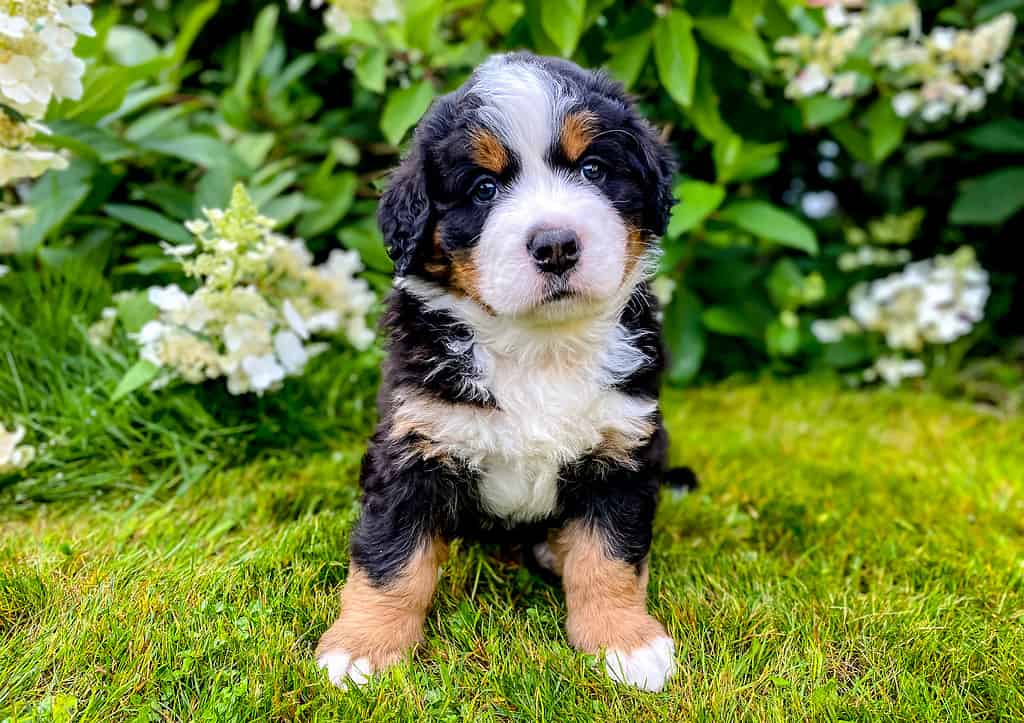
They remain puppies until two to three years of age.
©iStock.com/Marketa Vydrova
Giant breeds like Bernese Mountain Dogs grow rapidly, but they reach their full size much more slowly than smaller dogs. Your Berner isn’t likely to reach their full size until they are two or even three years old.
In the years following, they may continue to gain weight and muscle mass but shouldn’t continue to grow in height.
Your Berner should see the vet multiple times throughout their puppyhood to stay up to date on vaccines. Once the puppy vaccines are out of the way, they should see the vet at least once a year.
Your veterinarian can tell you more about your Bernese Mountain Dog’s growth, food intake, and exercise needs. They’ll also perform a routine exam, bloodwork, and more to ensure your dog is healthy.
How Much Should Bernese Mountain Dogs Eat Daily?
Always consult your veterinarian when it comes to your dog’s diet. The most commonly-recommended foods by vets are those that meet WSAVA guidelines, which include having a vet nutritionist formulate the recipes, testing the food for quality, and more.
Many professionals recommend staying away from raw, grain-free, and boutique diets, as they can be linked to health issues. Homemade diets aren’t recommended unless you consult with a certified vet nutritionist to develop a recipe that meets all of your dog’s nutritional needs.
When it comes to quantity, the amount your dog eats will vary depending on their weight, diet, exercise routine, and the type of food they eat. You may feed anywhere from 3-6 cups of kibble daily and should break your Berner’s food intake into at least two to three meals per day.
Alongside food, your dog should always have access to fresh water.
How Big Will My Bernese Mountain Dog Be When They’re Fully Grown?
According to the American Kennel Club (AKC), female Berners typically grow to about 23-26 inches tall and weigh 70-95 pounds. Males are larger, standing 25-27.5 inches tall and weighing 80-115 pounds.
Of course, there are healthy, purebred Bernese Mountain Dogs who fall outside of these ranges. They may weigh as much as 130+ pounds!
Your puppy’s current weight can tell you more about what size they’ll grow to be, as can your veterinarian! However, no one can know for sure until your dog reaches their full height and weight.
When Should My Bernese Mountain Dog Be Spayed or Neutered?
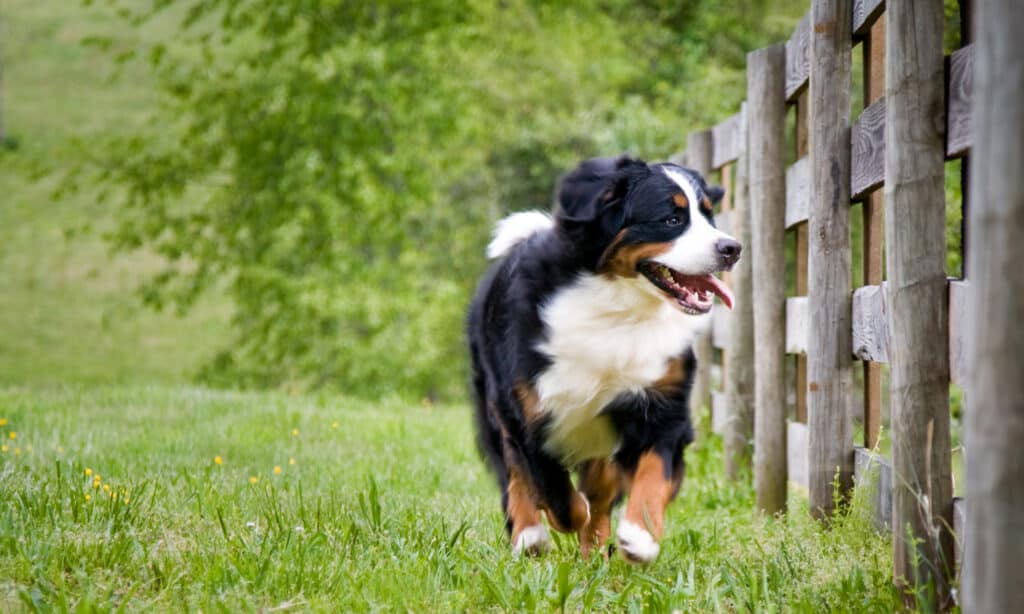
Research is showing that it might be beneficial to wait to spay and neuter large dogs until they are one to two years old.
©vahamrick/Shutterstock.com
In the United States, it’s common to spay or neuter a dog as young as possible. This is because they can reproduce as young as five to six months old, and the dog population can get out of hand quickly!
There’s a lot of debate as to when a dog, especially a giant breed, should be spayed or neutered. Some people believe that waiting until females are at least one year old and males are two years old is best. This is because neutering undeveloped male Berners, in particular, may be linked to joint issues and other health problems.
However, late spaying and neutering (or not doing so at all) are also linked to health issues, particularly reproductive cancers. If you’re unable or unwilling to keep your dog away from other intact dogs, there is also a risk of creating unwanted and poorly-bred puppies.
This is a decision you should make with the help of your veterinarian, who should be up-to-date on the newest research and who also knows your individual dog, family, and life circumstances.
When Should My Bernese Mountain Dog Be House Broken?
You can begin teaching your dog to potty outside once you adopt them, but they won’t tell you when they need to go at this age and shouldn’t be expected not to have accidents indoors.
It’s best to stick to a schedule based on your puppy’s age. For instance, a two-month-old cannot hold their bladder for more than two hours. You’ll likely need to bring them out more often than this.
Watch your puppy for signs that they need to go, and bring them outside if they begin to sniff around, crouch, or wander off in search of a potty spot. Keep them contained in a room with hard floors, leashed by your side, or in a playpen to prevent accidents in undesirable areas.
Also pay attention to when your pup has to potty, such as after meals, baths, or playtime. Take them outside right before you go to sleep and first thing in the morning, with extra potty breaks in between depending on their age.
As your pup ages, they’ll get better at holding their bladder and will learn to tell you when they need to potty. However, even year-old Berners may have an occasional accident–remember that they’re puppies for longer than most dog breeds.
Never punish your dog for potty accidents. Clean the area thoroughly to avoid reoccurrence and continue as normal without scolding your dog. Ultimately, it’s not their responsibility to potty inside, but ours to teach them how and to give them frequent opportunities to go.
Punishing accidents can also make your dog afraid to potty in front of you at all, even outdoors, which makes potty training harder. It can also cause fear and anxiety, which can make a dog potty indoors even more regularly.
When Should My Bernese Mountain Dog Stop Eating Puppy Food?
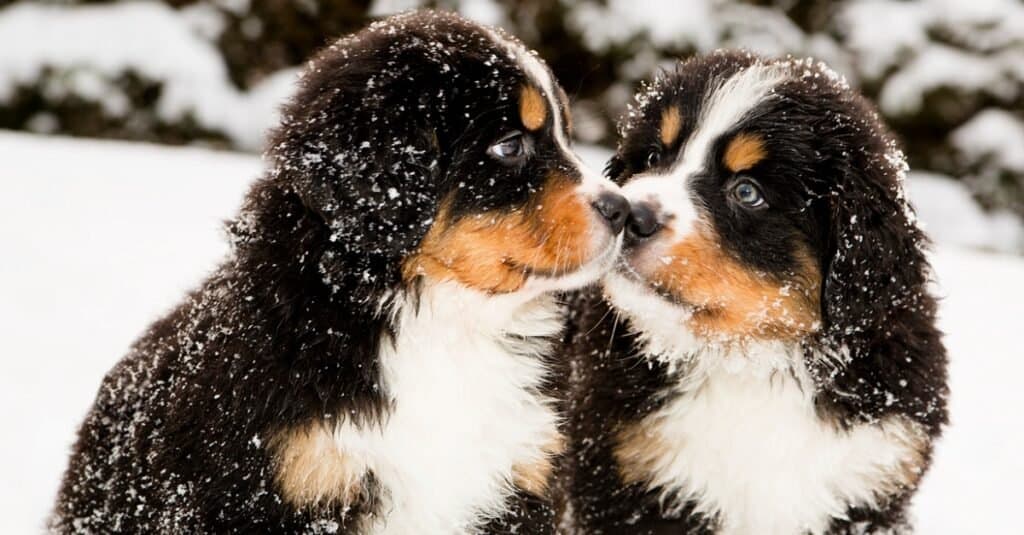
Many Berners will continue eating puppy food until they’re around two years old.
©iStock.com/vetdoctor
Puppy food has higher protein and fat content, as growing dogs need more calories. It’s important to start your puppy on a food formulated for them, and this is especially true with rapidly-growing giant breeds.
Read the label on your giant-breed puppy food to see when your Bernese Mountain Dog should stop eating it. For instance, Purina Pro Plan and Iams puppy foods are both for dogs under two years old. Meanwhile, Royal Canin recommends switching to their “Junior” line at around eight months and continuing to feed it until the two-year mark.
Each brand might be a little different, so be sure to follow their recommendations. You can also speak to your veterinarian if you’re concerned about when and how to make the switch.
Switching too early or too late can impact your dog’s growth and overall health, so make sure to switch in a timely manner–but don’t worry if, say, you have leftover kibble and decide to feed puppy food for an extra week or so.
How to Switch From Puppy to Adult Food
Switching foods should always be done gradually. Start by mixing 10% adult and 90% puppy food, then move on to 25% adult and 75% puppy. Continue adding 25% more adult food every couple of days until you’re feeding solely the adult dog food.
If your Bernese Mountain Dog has tummy issues during this process, try going back a step and keeping them at those portions for a few days. Some dogs have more sensitive stomachs than others.
Keeping your dog on the same type of food they were on as a puppy can also help ease them into adult food. This means feeding both the same brand and the same product line.
The Best Foods for Bernese Mountain Dog Puppies
- Made for large-breed dogs under two years old
- Main protein source: chicken
- Recommended by veterinarians
- Purina has few dog food recalls compared to other large brands
- Made for giant-breed puppies under eight months old
- "Junior" version available for dogs eight months to two years
- Main protein source: chicken
- Recommended by veterinarians
- Made for large-breed dogs under two years old
- Main protein source: chicken
- Recommended by veterinarians
- Cost-effective
When Will My Bernese Mountain Dog Start Losing Teeth?
Bernese Mountain Dog puppies typically begin losing their puppy teeth at around four to five months old. This is a painful time as their new adult teeth grow in, and puppies chew frequently to soothe their gums.
Provide plenty of chew toys of different textures, shapes, and sizes. This will allow them to choose what they like best.
Since Berners are so large, they can do a lot of damage during the teething phase. Crate training can help for those times when you’re out of the house so that you don’t come home to a chewed-up couch!
Supervise your pup while you are home, and redirect them to toys if they try to chew inappropriate objects–including human hands or sleeves. Keep a tidy home with items your puppy might chew that are well out of reach, and make sure there aren’t any choking hazards around where they can find them.
Be patient with your puppy during this time, and remember that it’s just a phase. Teething doesn’t last forever!
When Should I Start Training My Bernese Mountain Dog?
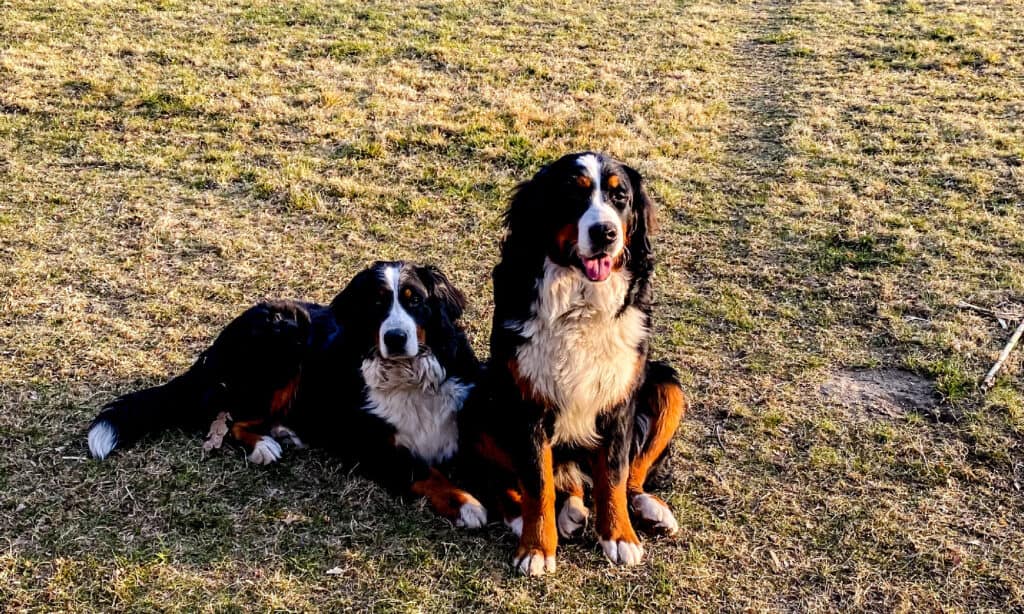
Training can start as soon as you bring your puppy home, but keep your expectations of them realistic!
©iStock.com/Marketa Vydrova
Training should begin before you adopt your Bernese Mountain Dog with either their breeder or former home. Of course, no one’s teaching a four-week-old pup to sit, but they are learning how to interact with others at this age.
Socialization, or learning how to navigate new experiences, is crucial for all dogs–but especially giant breeds, who can easily hurt themselves or others if not taught how to behave. One of the most important things you can do for your pup is to slowly introduce them to a variety of new people, places, animals, and objects.
Of course, manners are also important for large dogs to learn quickly. In no time, your Berner will grow quite large and may be able to knock people down or hurt them with their sharp puppy teeth.
Don’t allow your puppy to behave in ways you wouldn’t want a 70+ pound dog to act. Redirect biting from hands to toys, discourage jumping, and teach overexcited pups how to greet people calmly.
It’s also important to be patient with your puppy and acknowledge their developmental phase. For instance, biting is normal during teething, even though your Berner will be bigger than most other pups of their age. You may see a rebellion during adolescence as well, which is normal for all dog breeds.
Always use force-free training methods, never aversive or punishment-based training. You want to promote a healthy bond between you and your dog, not a relationship based on fear!
Lastly, if you want to exercise with your Berner or try out dog sports, make sure not to overwork their joints while they’re growing. It’s best to wait until they’re fully grown to try things like walking or running long distances, or jumping.
What Cues Should I Teach My Bernese Mountain Dog First?
While just-for-fun tricks are great, it’s best to start with the essentials. These are cues that every dog must learn, usually for their or others’ safety but also to make living with them enjoyable.
Basic cues to start with include:
- Sit
- Down
- Recall (“come”)
- Stay
- Leave it: To ignore an item, such as food dropped on the floor
- Drop it: To drop an item already in their mouth
- Go potty: Potty training simply teaches your dog to go outside, but the “go potty” cue tells them to go now
- Jump Up: Used to get your dog into the car, couch, or other area that involves jumping
Aside from specific cues, you’ll also want to teach life skills such as tolerating handling, grooming, and more.
You will likely also want to teach more cues that are essential for your household but optional overall. These may include:
- Off: To stop them from jumping up on people
- Place: To go to a certain area, such as their crate or bed
- Wait: Similar to stay, but typically used before feeding a meal
- Step: To step over a leash that’s starting to tangle
Of course, there are also a plethora of other cues, both practical and fanciful, that your Bernese Mountain Dog can learn. There’s no limit if you and your pup enjoy training!
Be sure to keep your cues different enough from one another that your pup won’t get confused. For instance, using both “sit down” and “lay down” can be confusing since they sound so similar.
As we discussed above, you should only use positive reinforcement during training sessions. Bring your Berner’s favorite treat, or choose a toy and make a game of it!
Keep training sessions short and engaging so that your dog always wants to come back for more next time.
When Will My Bernese Mountain Dog Calm Down?

Some Bernese Mountain Dogs will maintain puppy-like energy into their adult years.
©iStock.com/Kriste Sorokaite
Bernese Mountain Dogs are known for being calm, but you might not see this in your puppy–even at two or three years old. They remain immature longer than most breeds, and you may see that puppy energy long into their adult years.
Most Berners will calm a bit by the time they’re two to three years old, as they’re now adult dogs with more patience and impulse control. However, that puppy-like energy might stick around for several more years.
By seven years old, your Bernese Mountain Dog is considered a senior and will likely have less energy than they did in their younger years.
Every dog is different, so you might end up with an unusually calm puppy or a senior who’s still rambunctious! To keep your dog “young” for as long as possible, daily exercise is key! It’ll also help to tire them out if they have too much pent-up energy.
Mental enrichment is also just as important. If you feel like your puppy is always on the go but still not tired, they may be missing mental stimulation.
Another possibility is lack of sleep–this can actually cause pups to act out, so you may need to enforce naps!
If your puppy’s energy levels are causing problems, you might also consider hiring a force-free dog trainer to help.
Common Health Issues Your Bernese Mountain Dog Might Experience
Common health problems in Bernese Mountain Dogs include:
- Hip and elbow dysplasia: Deformities of the hip or elbow that occur while a puppy is growing
- Bloat: A deadly condition in which a dog’s stomach fills with gas or air and flips inside of the body
- Histiocytosis: A hereditary condition that causes an increase in white blood cells and is sometimes cancerous
- Osteochondritis dissecans (OCD or OD): When a dog’s bone and cartilage are disconnected from one another during development
- Von Willebrand’s disease: A blood clotting disorder that is hereditary
Some conditions have genetic tests available, and reputable breeders will have all recommended health tests openly available for both parents. Never shop with a breeder who doesn’t health test their dogs!
What Are the Grooming Requirements for a Bernese Mountain Dog?
Bernese Mountain dogs have a double coat – a longer guard coat and an undercoat. They require grooming every 4 to 8 weeks, possibly more frequently during periods of shedding which occur in spring and fall.
When bathing your dog yourself, a Hypo-Allergenic shampoo is a good choice if your Bernie has skin allergies. If your dog doesn’t have these issues, a quality scented dog shampoo will work well. Ending the bath with a conditioner can help your dog’s coat remain hydrated. In periods of shedding, there are special products to aid in that process.
Pictures of Bernese Mountain Dogs as Puppies
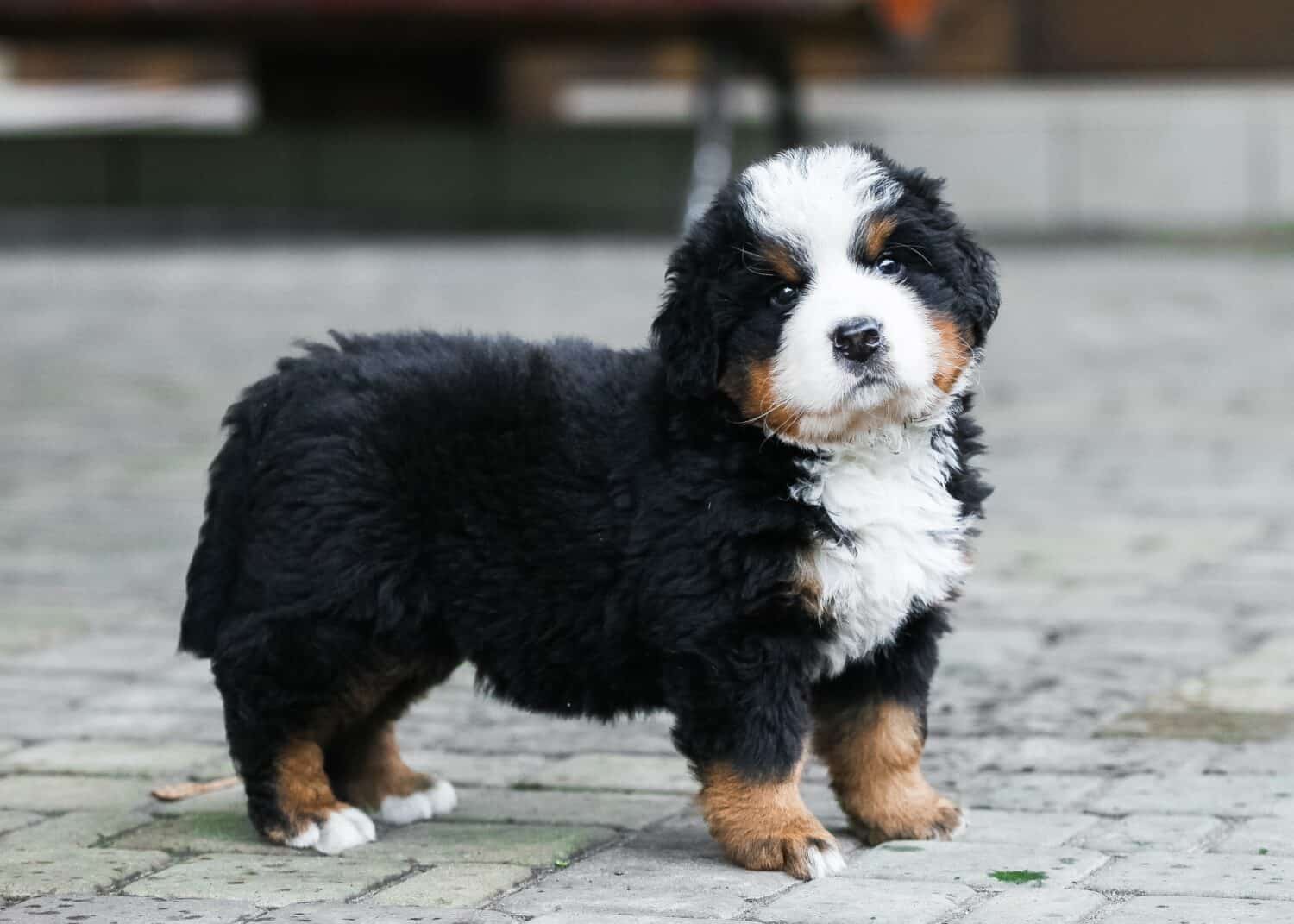
Bernese Mountain Dog puppies typically go to their forever homes at around 8-12 weeks.
©Didkovska Ilona/Shutterstock.com
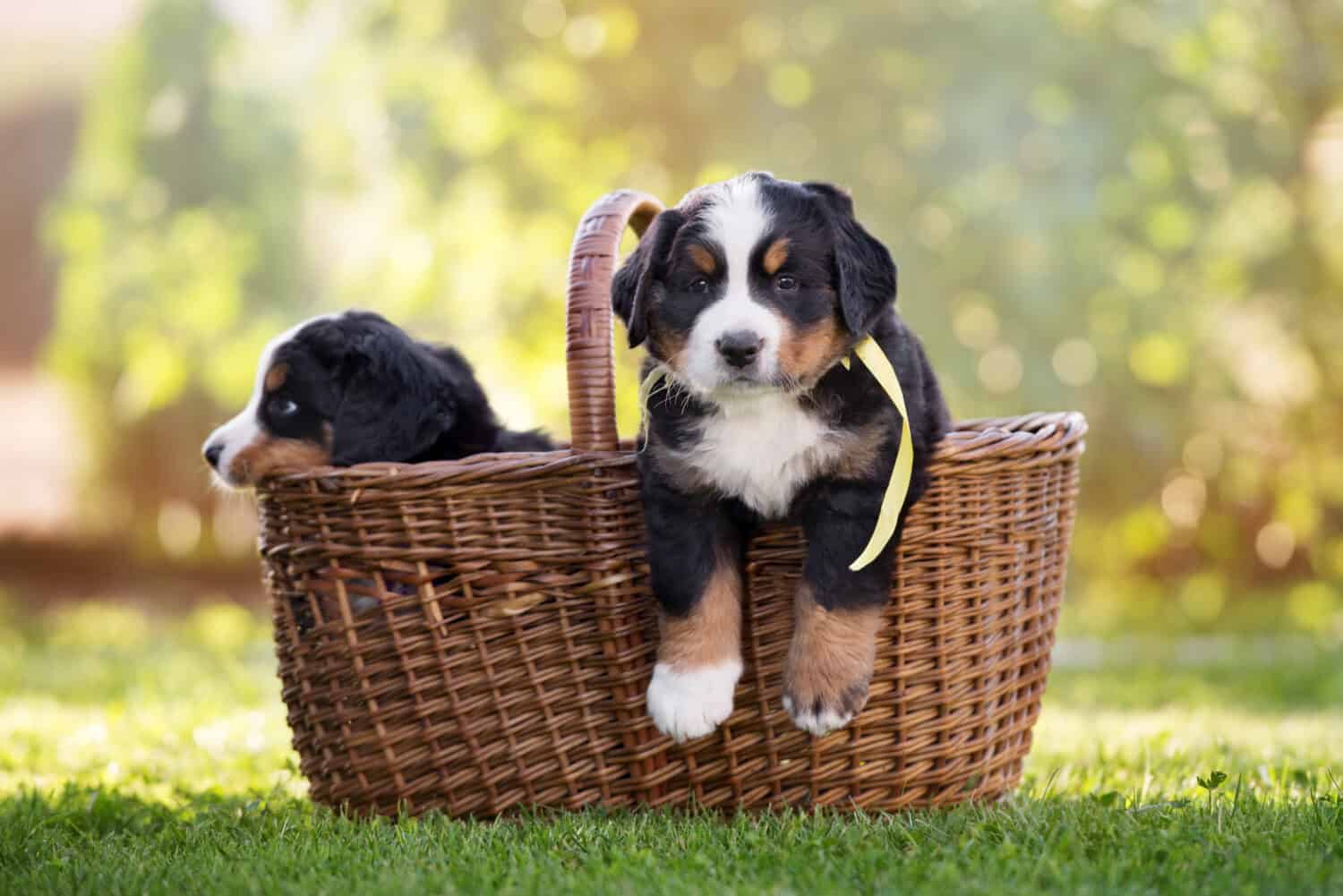
They grow quickly and don’t stay small for long!
©otsphoto/Shutterstock.com
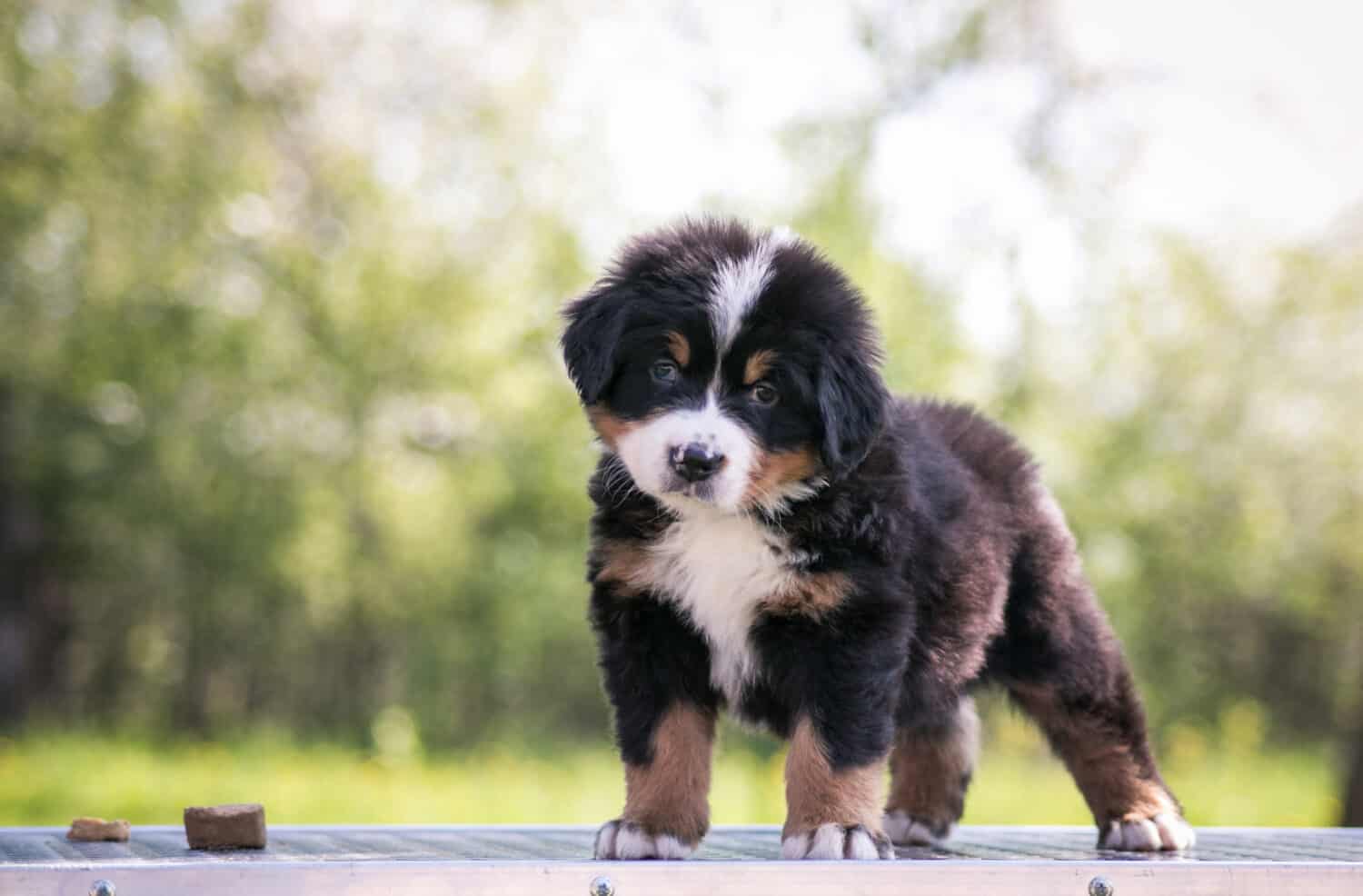
Puppies may also have shorter coats than adult Berners.
©Eve Photography/Shutterstock.com
Pictures of Bernese Mountain Dogs at 6 Months
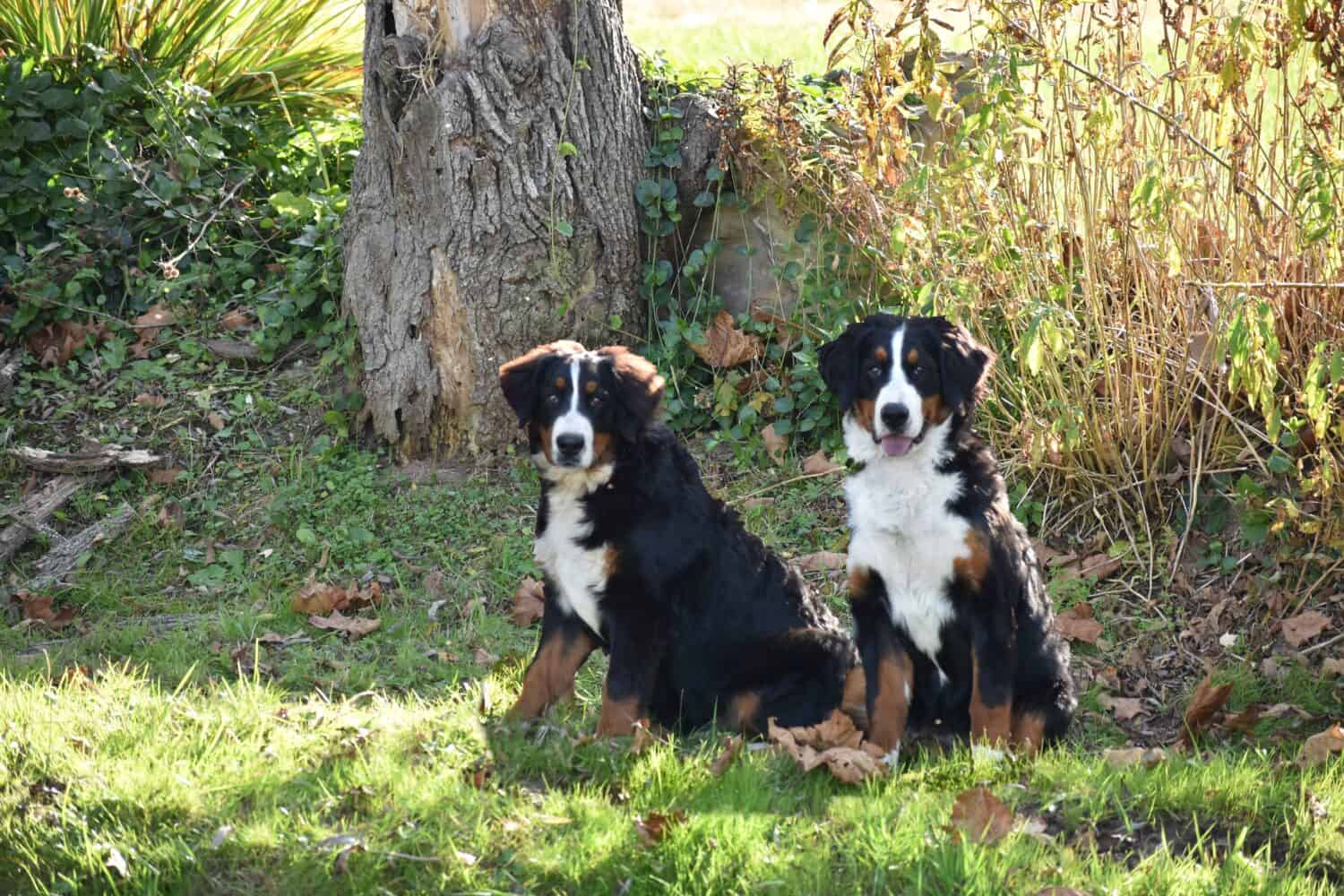
By six months of age, Bernese Mountain Dogs have grown a lot!
©SShank/Shutterstock.com
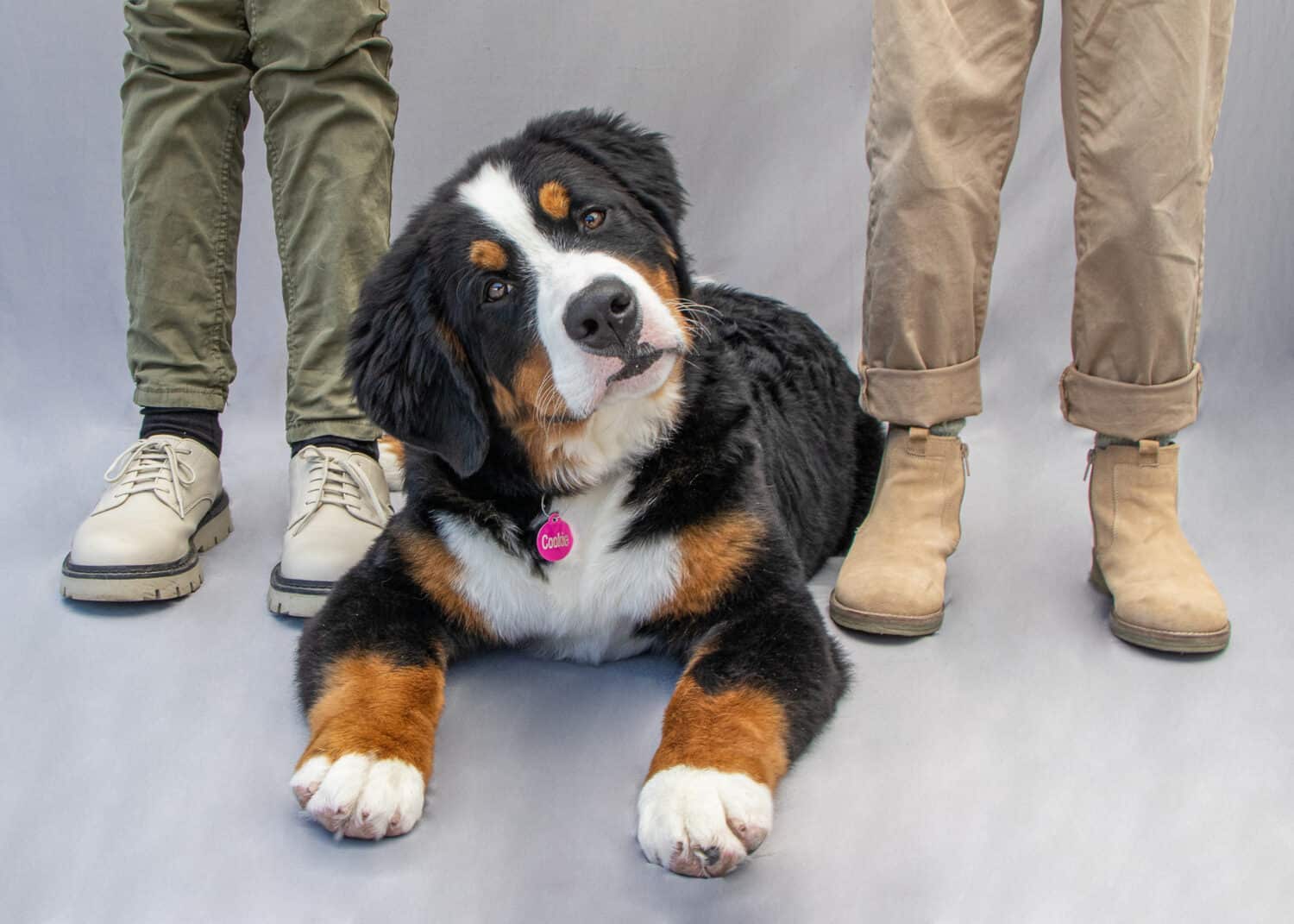
They’ve still not yet reached their full height or weight.
©JC2510/Shutterstock.com
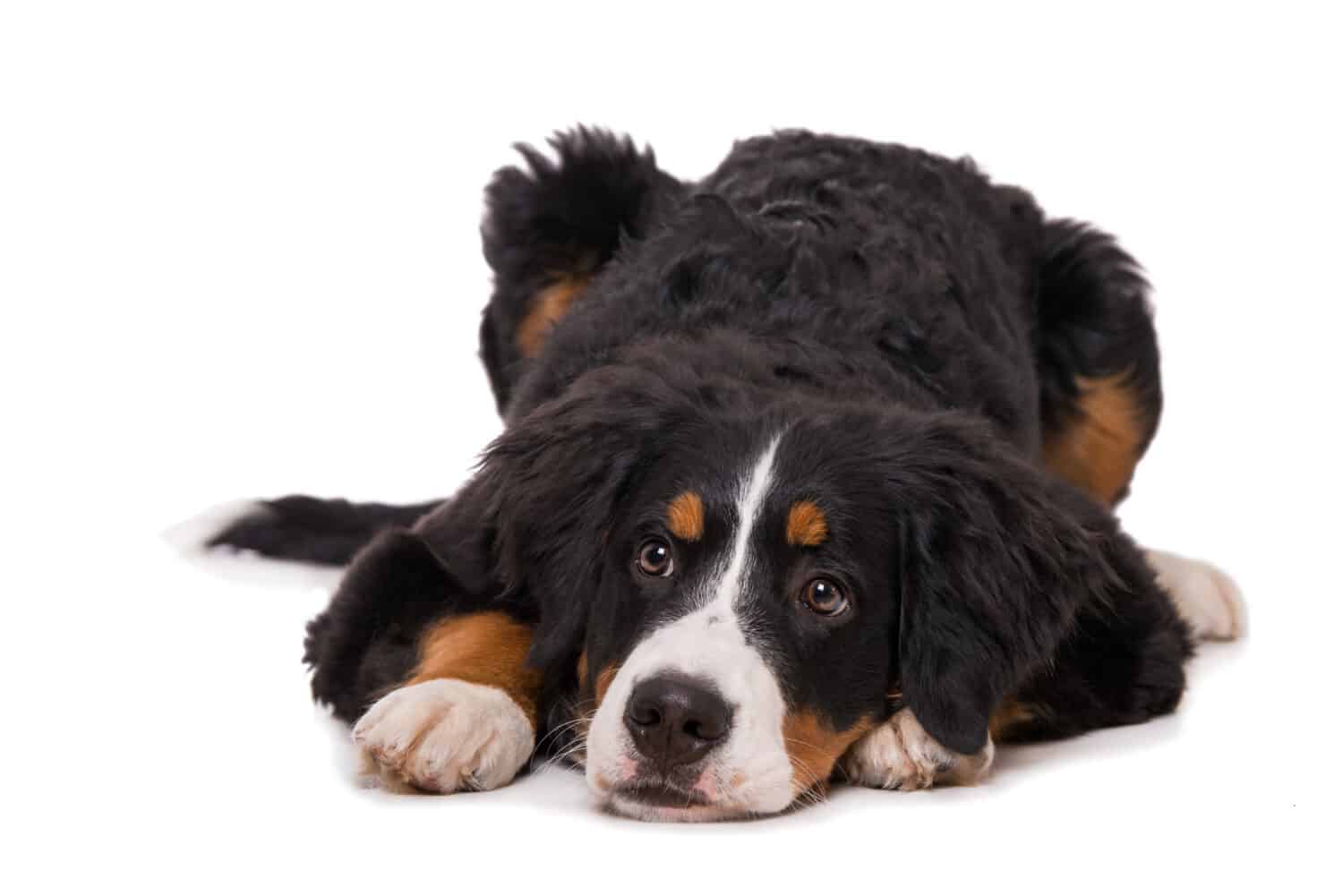
The average size for a six-month-old Berner is 45-85 pounds.
©Dora Zett/Shutterstock.com
Pictures of Fully Grown Bernese Mountain Dogs

Adult Berners weigh anywhere from 70-130 pounds.
©Eve Photography/Shutterstock.com
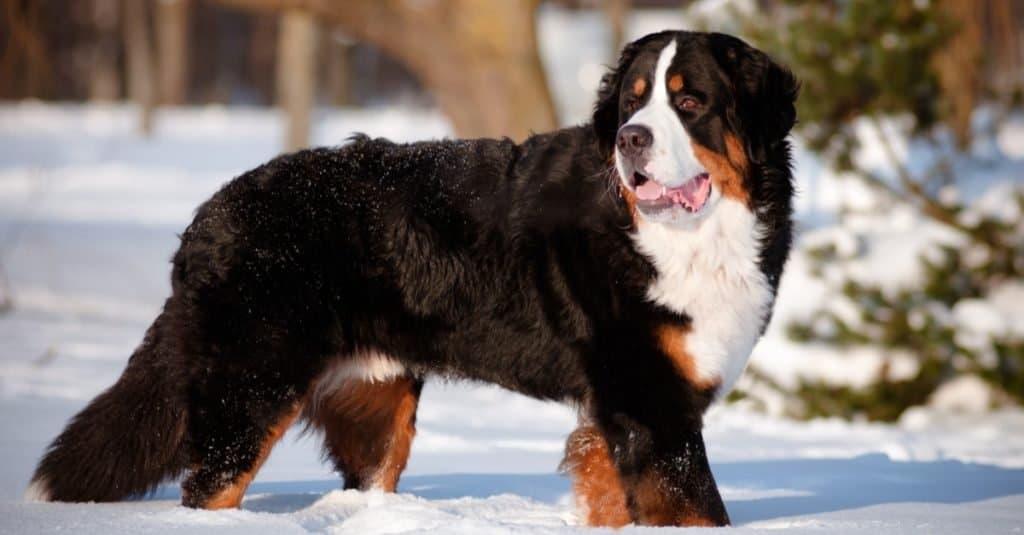
Owning a giant breed is a huge responsibility, and their growth is much different from smaller dogs.
©otsphoto/Shutterstock.com
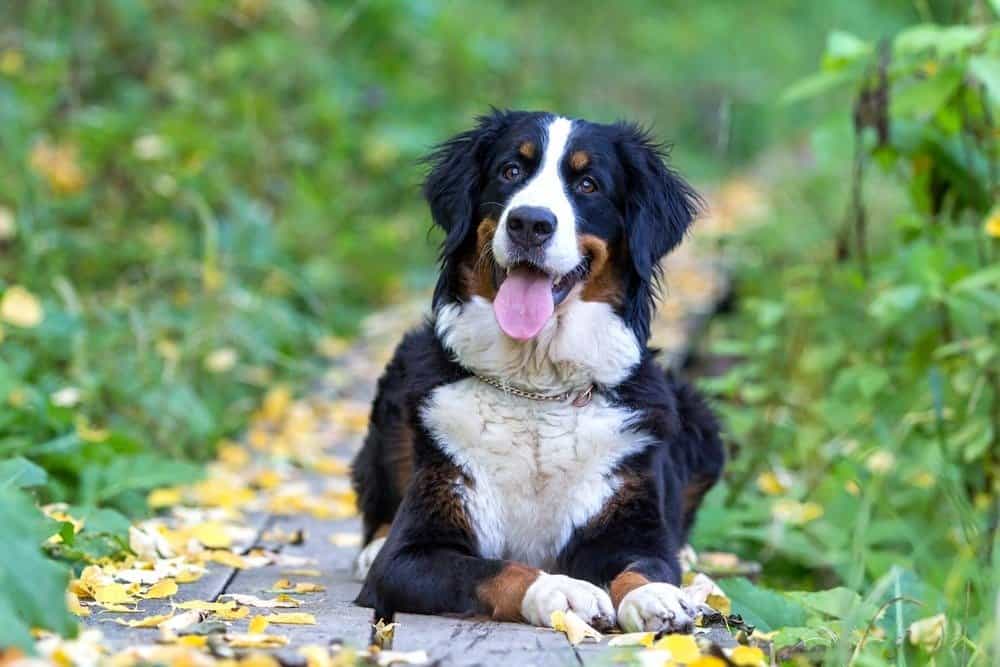
Given proper care, Bernese Mountain Dogs are an excellent breed to live with!
©DragoNika/Shutterstock.com
Thank you for reading! If you have feedback on this post, please contact the AZ Animals editorial team.
Ready to discover the top 10 cutest dog breeds in the entire world?
How about the fastest dogs, the largest dogs and those that are -- quite frankly -- just the kindest dogs on the planet? Each day, AZ Animals sends out lists just like this to our thousands of email subscribers. And the best part? It's FREE. Join today by entering your email below.
Thank you for reading! Have some feedback for us? Contact the AZ Animals editorial team.










